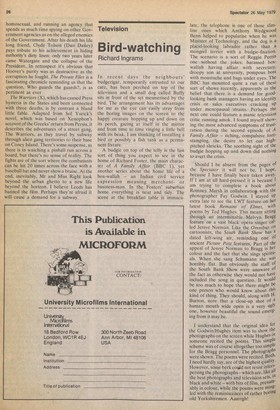Bird-watching
Richard Ingrams
In recent days the neighbours' budgerigar, temporarily entrusted to our care, has been perched on top of the television and a small dog called Buffy sits in front of the set mesmerised by the bird. The arrangement has its advantages for me as the eye can easily stray from the boring images on the screen to the happy creature hopping up and down on its perch, gazing at itself in the mirror and from time to time ringing a little bell with its beak. I am thinking of installing a bird or possibly a fish tank as a permanent fixture.
A budgie on top of the telly is the last sort of thing you expect to see in the home of Richard Foster, the main character of A Family Affair (BBC 1), yet another series about the home life of a box-wallah — an Indian civil service expression meaning merchantor business-man. In the Fosters' suburban home everything is neat and tidy. The scene at the breakfast table is immacu late, the telephone is one of those slim line ones which Anthony Wedgwood Benn helped to popularise when he was Minister of Technology, and the dog is a placid-looking labrador rather than a mongrel terrier with a budgie-fixation. The scenario is a sort of Reggie Perrin one without the jokes: harassed box wallah having affair with secretarY, droopy son at university, pompous boss with moustache and bags under eyes. The BBC has mounted quite a run of these sort of shows recently, apparently in the belief that there is a demand for goodlooking bank managers having an identity crisis or sales executives cracking up under menopausal strains. Perhaps the next one could feature a manic television critic running amok. I found myself showing the most advanced symptoms of frustration during the second episode of A Family Affair — itching, compulsive foot' stamping, the desire to let out highpitched shrieks. The soothing sight of the budgie hopping up and down did nothing to avert the crisis.
Should I be absent from the pages of the Spectator it will not be, I hope, because I have finally been taken away. If I am at all hard-pressed it is because I am trying to complete a book about Romney Marsh in collaboratioi with the photographer Fay Godwin. I stayed up extra late to see the LWT feature on her latest book Remains of Elmet, with poems by Ted Hughes. This meant sitting through an interminable Melvyn Bragg feature on a vast black opera singer called Jessye Norman. Like the Omnibus on cartoonists, the South Bank Show has a dated left-wing air, reminding one of ancient Picture Post features. Part of the appeal of Jessye Norman to Bragg is her colour and the fact that she sings spirituals. When she sang Schumann she was horribly flat. But obviously the staff of the South Bank Show were unaware of the fact as otherwise they would not have included the song in question. It would be too much to hope that there might be one person who would know about this kind of thing. They should, along with a Burton, note that a close-up shot of a human mouth wide open is a very LiglY one, however beautiful the sound emerging from it may be.
I understand that the original idea for the Godwin/Hughes item was to show the photographs on the screen while Hughes or someone recited the poems. This sing* scheme was of course altogether too simPle for the Bragg personnel. The photograPh,s were shown. The poems were recited. Bot"' I need hardly say, are of the highest quality. However, some berk could not resist inters; persing the photographs —which are, like ta the best photographs and television sets, ill black and white — with bits of film, presuniably in colour, while the poems were mingled with the reminiscences of rather boring old Yorkshiremen. Aaarrgh!


































 Previous page
Previous page